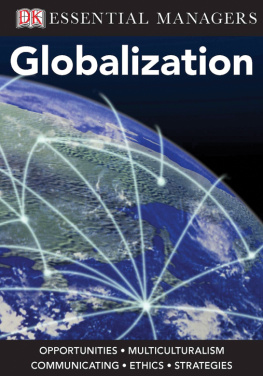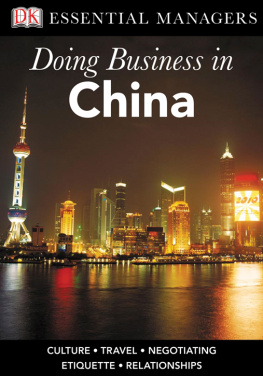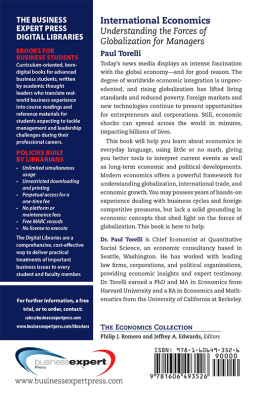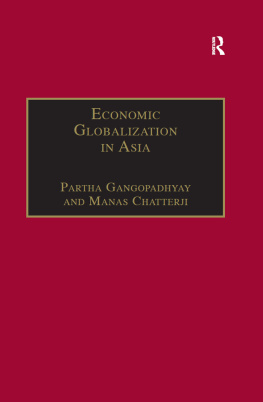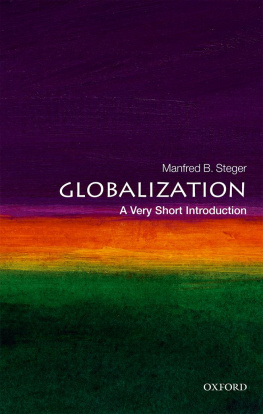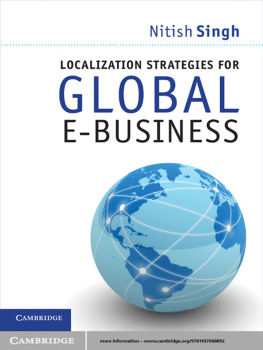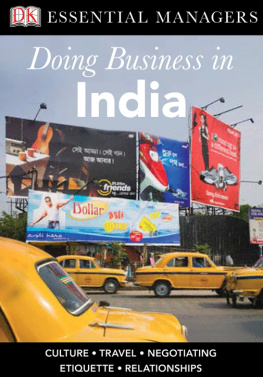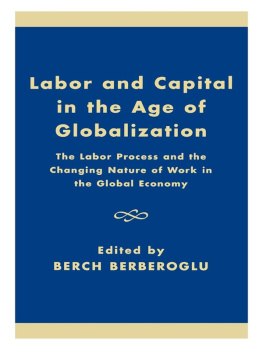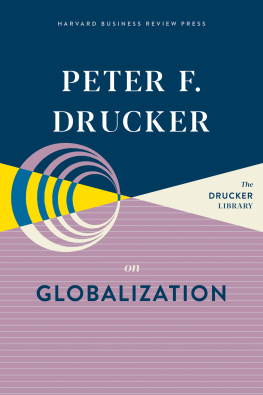Pervez Ghauri - Globalization
Here you can read online Pervez Ghauri - Globalization full text of the book (entire story) in english for free. Download pdf and epub, get meaning, cover and reviews about this ebook. year: 2008, publisher: DK Publishing, genre: Politics. Description of the work, (preface) as well as reviews are available. Best literature library LitArk.com created for fans of good reading and offers a wide selection of genres:
Romance novel
Science fiction
Adventure
Detective
Science
History
Home and family
Prose
Art
Politics
Computer
Non-fiction
Religion
Business
Children
Humor
Choose a favorite category and find really read worthwhile books. Enjoy immersion in the world of imagination, feel the emotions of the characters or learn something new for yourself, make an fascinating discovery.
- Book:Globalization
- Author:
- Publisher:DK Publishing
- Genre:
- Year:2008
- Rating:4 / 5
- Favourites:Add to favourites
- Your mark:
- 80
- 1
- 2
- 3
- 4
- 5
Globalization: summary, description and annotation
We offer to read an annotation, description, summary or preface (depends on what the author of the book "Globalization" wrote himself). If you haven't found the necessary information about the book — write in the comments, we will try to find it.
Globalization — read online for free the complete book (whole text) full work
Below is the text of the book, divided by pages. System saving the place of the last page read, allows you to conveniently read the book "Globalization" online for free, without having to search again every time where you left off. Put a bookmark, and you can go to the page where you finished reading at any time.
Font size:
Interval:
Bookmark:

80 Strand, London WC2R 0RL
LONDON, NEW YORK,
MUNICH, MELBOURNE, DELHI
London WC2R 0RL, England
Copyright 2008 Dorling Kindersley
Text Copyright 2008 Sarah Powell & Pervez Ghauri
Digital conversion by DK Digital Content, London and DK Digital Media, Delhi.
No part of this publication may be reproduced, stored in a retrieval system,
or transmitted in any form or by any means, electronic, mechanical, photocopying, recording, or otherwise, without the prior written permission of the copyright owner.
The world economy is being reshaped by a process of change that offers enormous opportunities and substantial threats to many businesses. Understanding globalization, its drivers and implications, is key to recognizing and responding to todays new business pressures. Ignoring it is not an option in a world in which the opening of markets and easing of restrictions on foreign direct investment have hugely increased competitive pressures.
Globalization offers a snapshot view of the history, drivers, and challenges of this process. Its information and advice will help managers to understand and take practical steps to address the enormous and rapid changes that are taking placechanges that affect every aspect of business life from communication and location to sourcing, manufacturing, servicing, distribution, marketing, and human resources. Armed with this knowledge, companies can more confidently pursue the many opportunities opening up to them.
The World Bank predicts that the global economy could expand from $35 trillion in 2005 to $72 trillion in 2030. To be successful, businesses need to be ever more aware of market forces, ever more competitive, ever more agile and rapid in adapting to change. The potential benefits of globalization for business and society are enormousas are the risks and the responsibilities. This book provides the information you need to guide you and your business to a successful global future.
Understanding Globalization
Globalization may be the dominant economic trend of our age, yet the urge to travel and trade has been as important to human history as that to invade and conquer. The history of global economic interaction holds valuable lessons for business today.
The term globalization is most commonly used today to refer to a specific economic phenomenonthe emergence, in the 1980s, of a single world market, dominated by multinational companies and characterized by the free flow of private capital across borders.
Globalization became a buzzword in the late 20th century because this was an era that saw a rapid and massive expansion in international trade and investmententhusiastically taken up by business and the media. The main agent of the change was widespread deregulationthe removal by governments of anticompetitive measures, such as price controls, in key markets around the world. As corporations, goods, services, and capital began to cross borders, consumers growing aspirations and involvement in financial markets added momentum.
The positive interpretation of the word globalization, or its early equivalent Americanizationreflecting US global power and influenceprimarily denoted a process of opening up of commercial and investment opportunities in new and often distant markets, leading to economic integration. Proponents of this positive view claimed that there would be a trickle-down effect by which capital would filter down from rich to poor countriesand thus lead to a fairer, more democratic and peaceful world.
Opponents of globalization, however, warn that it reduces the ability of nation-states to control their economies. They also raise ethical objections to the exploitation of developing markets and the imposition of Western values on indigenous cultures.
Whatever the interpretation, for the consumer globalization increasingly means that an everyday producta television set, for instancemight be designed in one country, manufactured in another using materials or components sourced from a third, marketed through a call center in a fourth, for delivery and use in any number of others. As such, labels of origin have clearly lost their meaning.
For business, the opportunities are unprecedented. UN estimates for 1990 showed some 35,000 multinational corporations with 150,000 foreign affiliates, and total stock of foreign direct investment worldwide of $1.7 trillion. Today there are believed to be some 60,000 such corporations. However, not all multinationals are big businesses. As new technology and management innovations promote entrepreneurial agility over size, a new size of multinationalthe micro-multinationalhas emerged.
The evolution of todays global market economy can be traced back to the emergence of the first interregional trade routes, markets, and migrations, developing through the creation of powerful regional empires, some of which lasted for hundreds, if not thousands of years.
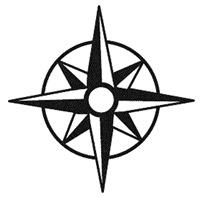
Well before 2000 BCE traders in high-status goods covered the huge distances between Mesopotamia (modern Iraq) and India. The centuries from 1600 to 600 BCE were characterized by power struggles for control of Syria, which lay at the junction of trade routes east to Mesopotamia, westward to Asia Minor and the Aegean, and south to Egypt. These early attempts at empire-building were to be replicated over the centuries in many parts of the world, creating political and military superpowers that united previously disparate kingdoms.
The first great empire, China, emerged in 221 BCE , lasting for some 2,000 years. Under the Han dynasty China traded silk and jade across caravan routes to Siberia, India, Persia, and the Mediterranean. Over the centuries other empires emerged, reshaping the regions of the world. In the 1st century BCE Rome succeeded Greece as the dominant power of the Mediterranean, forging an empire that at its height covered most of Europe and North Africa, with trading links as far as China and India, the Baltic, and Ireland. Combining military might and economic power, these early empires were characterized by a high degree of central authority; many, for example, imposed a shared currency across their territories. The impulse to spread religious philosophiesnotably Buddhism, Christianity, and, from the 7th century CE , Islamwas also a spur to expansion. Up until about 1350 the economies of both Christian Europe and the Islamic Middle East were boosted by African gold.
Font size:
Interval:
Bookmark:
Similar books «Globalization»
Look at similar books to Globalization. We have selected literature similar in name and meaning in the hope of providing readers with more options to find new, interesting, not yet read works.
Discussion, reviews of the book Globalization and just readers' own opinions. Leave your comments, write what you think about the work, its meaning or the main characters. Specify what exactly you liked and what you didn't like, and why you think so.

